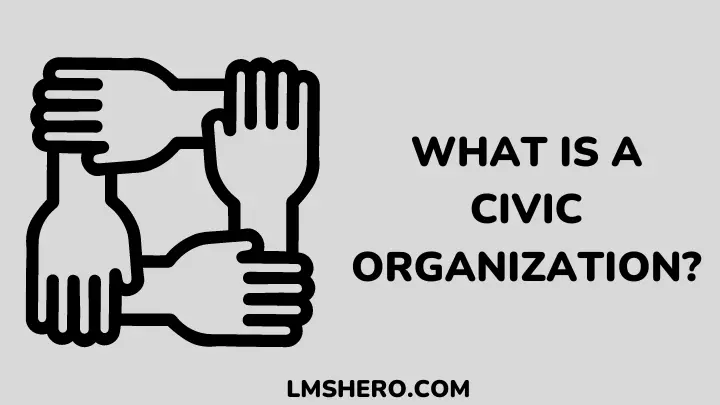Are you looking for a way to give back to your community while meeting new people and having fun? Look no further than a civic organization. These groups are essential in bringing people together, tackling local issues, and promoting positive change.
Whether you’re passionate about the environment, education, or social justice, there’s a civic organization out there that’s perfect for you.
In this article, I’ll explore civic organizations’ key features and activities and why they are important to building strong, vibrant communities. Let’s dive in.
What is a civic organization?
A civic organization is a group of individuals who come together to work for the betterment of their community. These groups often focus on an area of interest, such as education, the environment, or social justice.
Civic organizations are typically volunteer-based and operate without a profit motive. They aim to bring about positive change by mobilizing individuals, leveraging resources, and advocating for issues that matter to their community.
Some examples of civic organizations include neighborhood associations, community development corporations, local non-profits, and civic leagues. These groups can range from small, grassroots organizations to large, established non-profits with hundreds of members.
Key features of civic organizations
Civic organizations exhibit several key features that distinguish them from other types of organizations:
- Voluntary participation: Civic organizations rely on the voluntary involvement of individuals passionate about making a difference in their community.
- Non-profit orientation: Most civic organizations are non-profit entities driven by a sense of service rather than financial gain.
- Community focus: Civic organizations primarily work towards the betterment of the community they serve, focusing on issues and initiatives that directly impact the lives of residents.
- Collaborative approach: These organizations encourage collaboration among members, as well as partnerships with other community stakeholders, such as government agencies, businesses, and nonprofits.
- Democratic decision-making: Civic organizations often operate on democratic principles, allowing members to participate in decision-making processes actively.
Why civic organizations matter
Civic organizations play a vital role in building strong and vibrant communities. Here are some key reasons why they matter:
1. Fostering social cohesion
Civic organizations serve as a platform for individuals to connect, interact, and build community social networks. These organizations strengthen community bonds and create a sense of belonging among residents by fostering social cohesion.
2. Promoting civic engagement
Civic organizations empower individuals to participate actively in their community’s decision-making processes. Through various initiatives, such as town hall meetings, advocacy campaigns, and community projects, they encourage civic engagement and give a voice to community members.
3. Addressing community issues
Civic organizations tackle various community issues, from social inequalities to environmental concerns. By identifying problems, proposing solutions, and implementing action plans, they actively work towards resolving these issues and improving the community’s overall well-being.
4. Providing services and support
Many civic organizations provide valuable services and support to community members. These include educational programs, healthcare initiatives, recreational activities, and mentorship programs.
By filling gaps in service provision, civic organizations enhance the quality of life for individuals in the community.
5. Advocating for change
Civic organizations often advocate for change, pushing for policies and reforms that benefit the community. They raise awareness about important issues, lobby for legislative changes, and collaborate with policymakers to ensure the voices of the community are heard.
Activities of civic organizations

Civic organizations engage in various activities that align with their mission and goals. Let’s explore some common activities undertaken by these organizations:
1. Community outreach programs
Civic organizations organize community outreach programs to connect with residents and understand their needs. These programs can include informational sessions, workshops, or community events to foster engagement and gather feedback.
2. Volunteer projects
Volunteerism is a cornerstone of civic organizations. They coordinate and mobilize volunteers to participate in various projects, such as environmental clean-ups, food drives, tutoring programs, and disaster relief efforts.
These projects contribute to the community’s well-being and create a sense of solidarity among volunteers.
3. Advocacy and awareness campaigns
Civic organizations often initiate advocacy and awareness campaigns to address social issues. They raise public consciousness about poverty, homelessness, education, healthcare, or environmental sustainability, aiming to generate support and drive positive change.
4. Community development initiatives
Civic organizations actively participate in community development initiatives, striving to enhance their communities’ economic and social infrastructure.
These initiatives can involve revitalizing neighborhoods, supporting small businesses, promoting local arts and culture, or developing sustainable urban planning strategies.
5. Collaborations and partnerships
Civic organizations collaborate with other stakeholders, including government agencies, businesses, and nonprofits, to maximize their impact.
They leverage collective resources, knowledge, and expertise by forming partnerships to implement comprehensive solutions to community challenges.
FAQs
How can you get involved with a civic organization?
Research local groups that align with your interests to join a civic organization. Contact them, attend meetings, and express your willingness to volunteer or join. Many organizations have websites or social media pages where you can find information on how to get involved.
Can civic organizations receive funding?
Yes, civic organizations can receive funding through various sources. These can include grants from government agencies or foundations, donations from individuals or businesses, fundraising events, and membership fees.
However, compliance with legal and ethical guidelines is essential when accepting and utilizing funds.
Are civic organizations limited to specific regions?
Civic organizations can exist at different levels, from local grassroots initiatives to national or international organizations. While some organizations focus on a specific region or community, others operate on a broader scale, addressing issues that transcend geographical boundaries.
How do civic organizations impact local economies?
Civic organizations contribute to local economies by promoting community development, supporting small businesses, creating employment opportunities, and attracting investments.
Additionally, their initiatives can enhance tourism, foster cultural exchanges, and stimulate economic growth in the area.
Can you start your civic organization?
Yes. You can start your civic organization with a vision for addressing a specific community issue or promoting a cause.
Research similar initiatives, define your mission and goals, and assemble a dedicated team. Seek guidance from existing organizations or consult legal experts to ensure you comply with the necessary regulations.
Final thoughts
In conclusion, a civic organization plays a significant role in strengthening the community and driving positive change. They are characterized by their voluntary nature, non-profit status, and focus on public service.
By engaging in various activities, such as advocacy, fundraising, and volunteering, these organizations empower individuals to shape their communities and influence public policy actively.
Civic organizations serve as a platform for individuals to unite and work towards a common goal. They provide opportunities for personal growth, social interaction, and community engagement.
Whether it’s addressing issues related to education, health, or the environment, these organizations have the power to make a significant impact. We can all contribute to a better, more equitable society by supporting and participating in civic organizations.
You should also learn more about civic education.
Thanks for reading.






